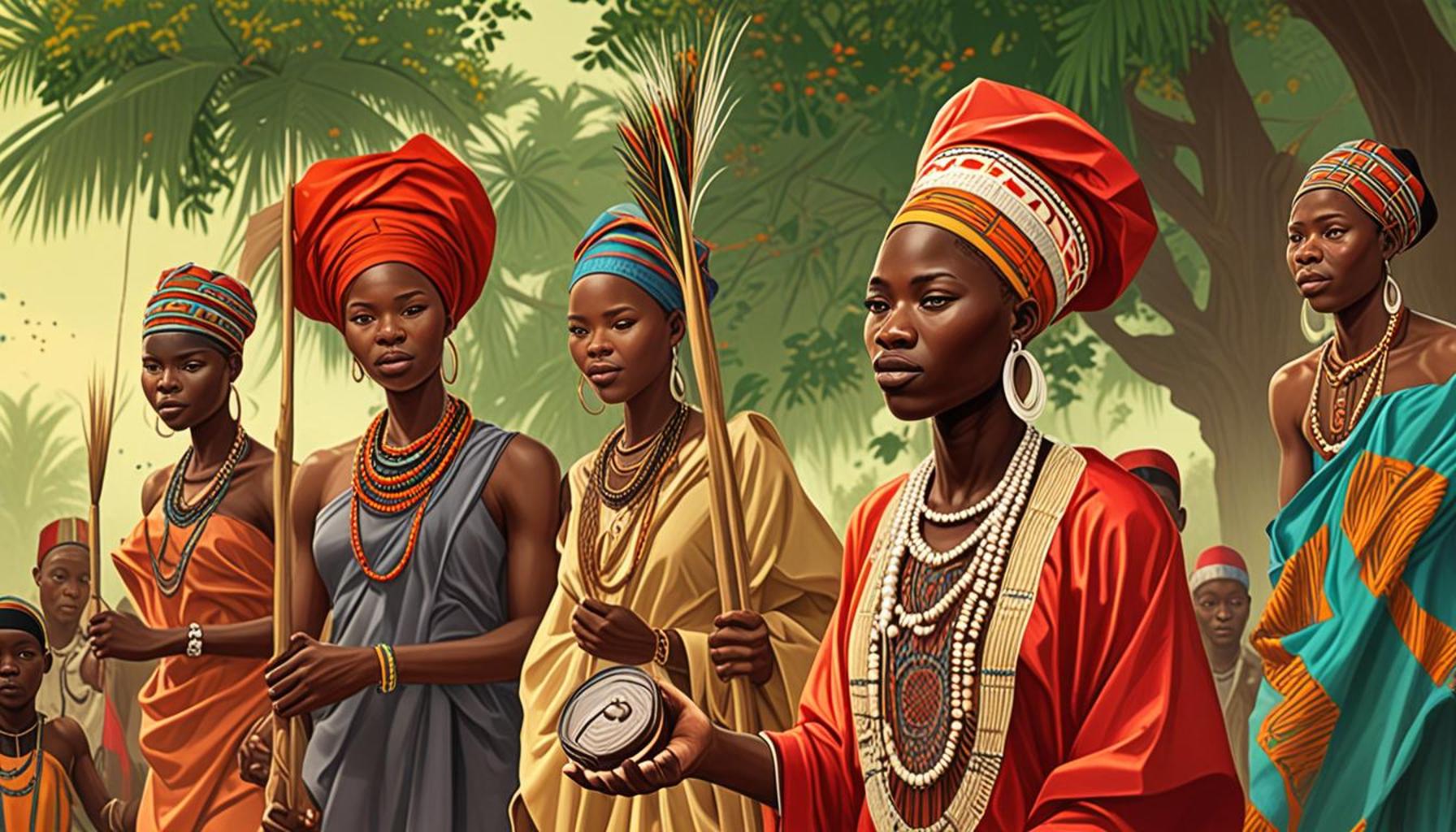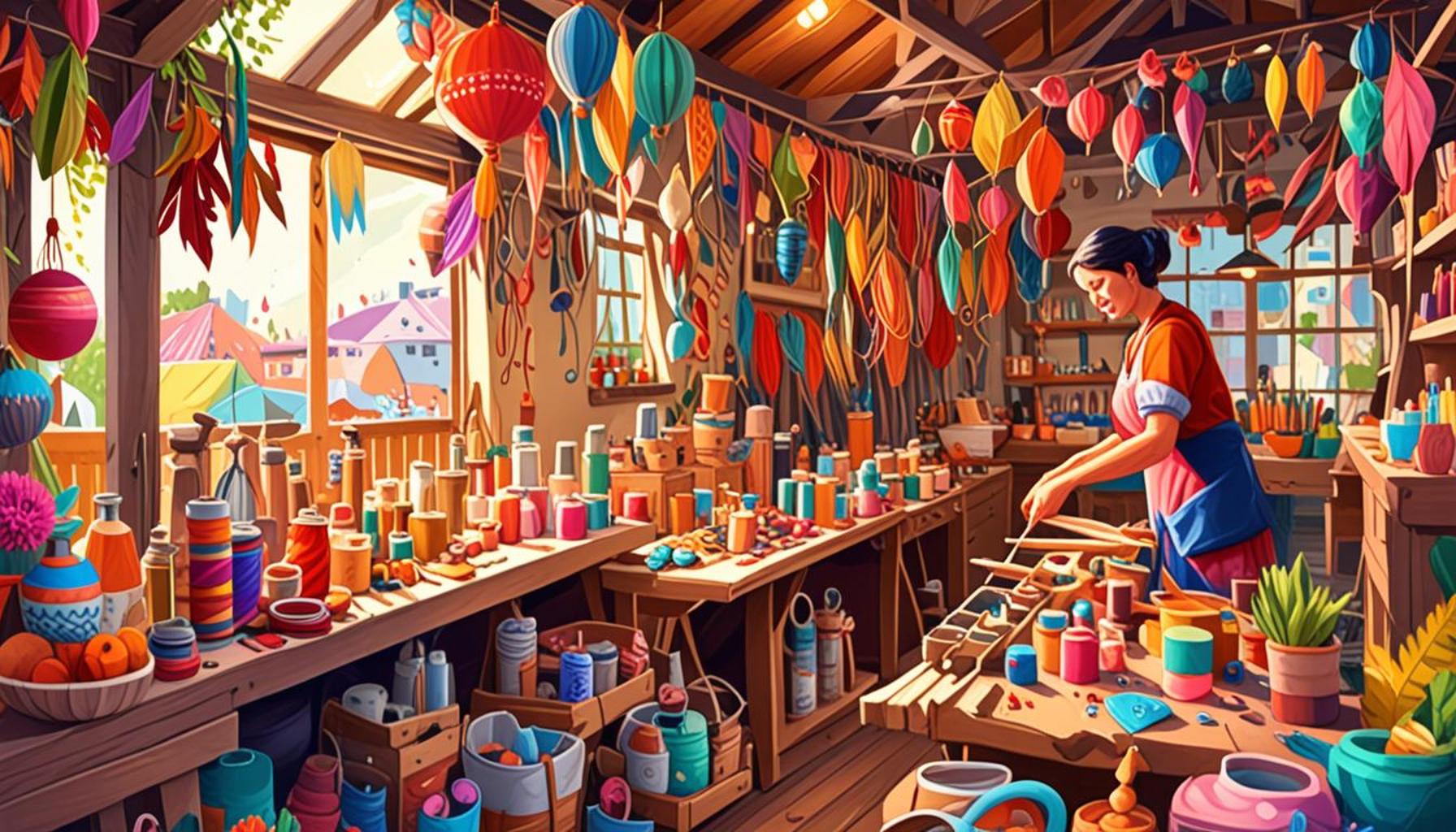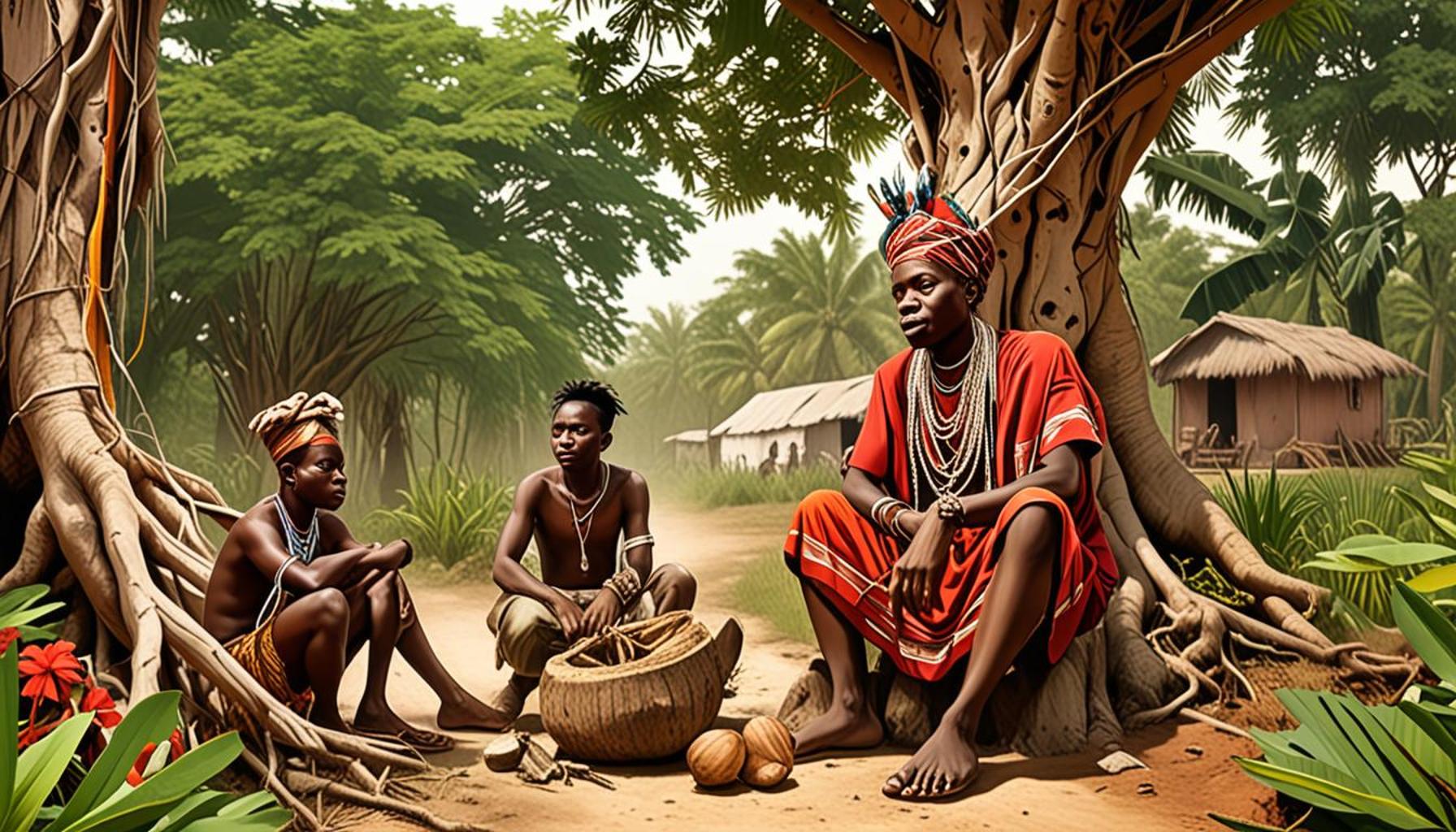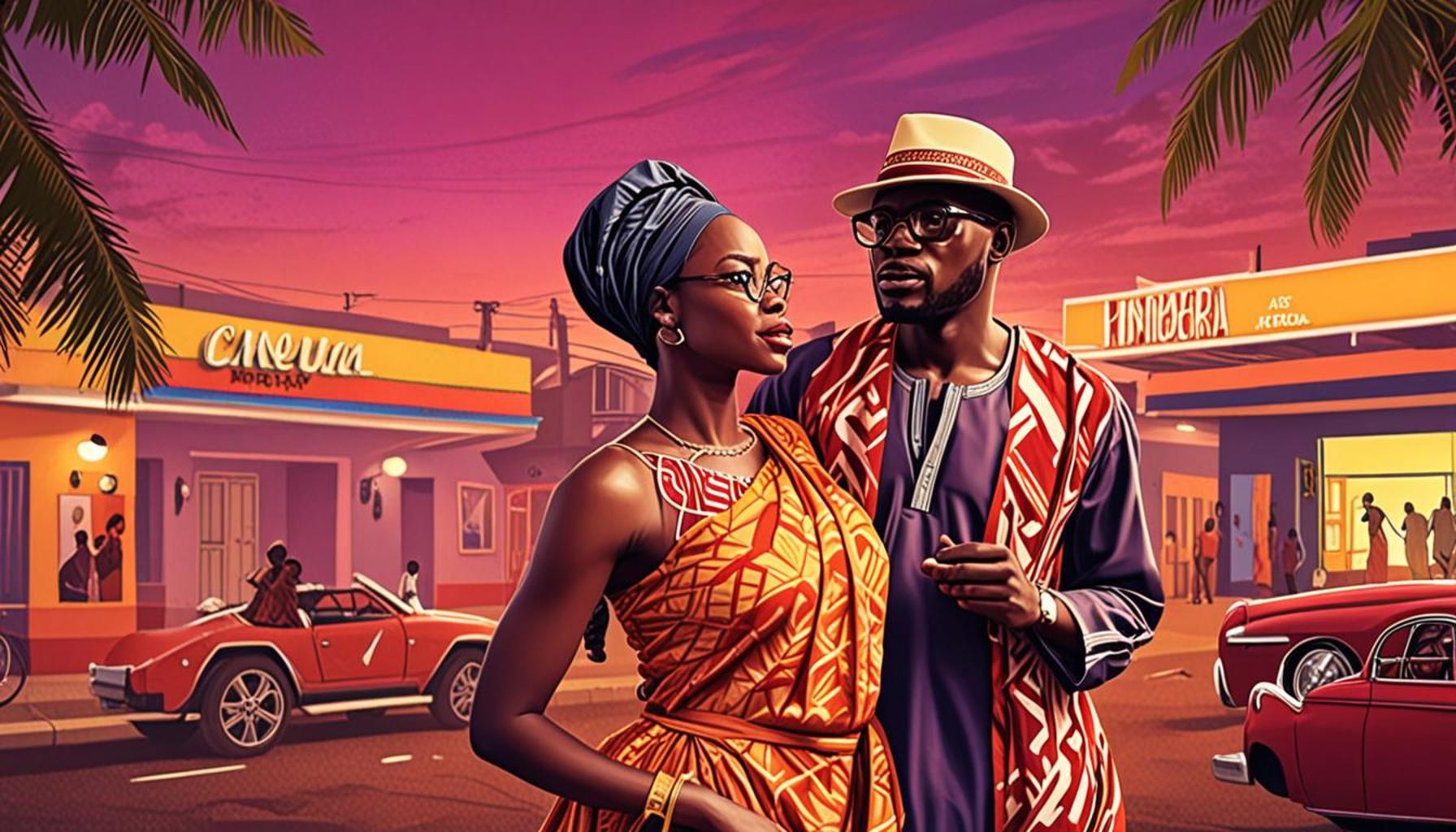Traditions and Ceremonies: Itineraries that Reveal the Ancestral Rituals of Various Nigerian Ethnicities

Nigeria is a tapestry woven with rich cultural threads that tell stories of its diverse ethnicities. Each group, from the vibrant Ibo to the stoic Hausa and the colorful Yoruba, possesses unique traditions and ceremonies that reflect their histories and values. Exploring these rituals offers a glimpse into the soul of Nigeria, revealing insights into its people’s beliefs, celebrations, and communal bonds.
Ancestral Rituals: A Journey Worth Taking
Every ceremony is steeped in symbolism and significance, serving as a bridge between generations. These events are not merely gatherings; they encapsulate the essence of Nigerian identity, where age-old practices are carefully preserved and passed down through the years. Some notable rituals include:
- The Ibo New Yam Festival – Celebrated annually, this festival marks the end of the harvesting season and involves a series of events filled with feasting, dancing, and cultural performances. Families showcase their gratitude to the Earth goddess and the ancestors for a bountiful harvest. Traditionally, the first yam of the season is offered to the gods before it is eaten, emphasizing respect for nature and spirituality.
- The Yoruba Wedding Traditions – A wedding among the Yoruba people is a colorful affair filled with rich customs, including the “money spray” during the reception, where guests shower the couple with cash as a show of support and celebration. The engagement ceremony, or “introduction,” is equally significant, blending traditional and modern elements, and showcases vibrant attire and intricate rituals, reinforcing family ties and community.
- The Durbar Festival – In the northern regions, particularly in cities like Kano and Katsina, the Durbar Festival is a grand spectacle that displays horsemanship, equestrianism, and traditional music. This festival celebrates the end of Ramadan and serves as a patronage of the Emir, symbolizing peace and prosperity. Riders adorned in traditional outfits perform intricate exercises, captivating audiences and drawing visitors from all walks of life.
These events are living archives of history, showcasing ancient practices that have withstood the test of time. By participating in or observing these celebrations, one can dive deep into the ancestral heritage that continues to shape modern Nigerian society. Whether it’s through the community spirit of the Ibo New Yam Festival or the royal pageantry of the Durbar, each ceremony narrates a story that enriches our understanding of Nigeria.
Why Explore These Ceremonies?
Understanding these traditions fosters a greater appreciation for Nigerian culture, illuminating the diverse tapestry that binds the nation together. Each ceremony not only reflects unique beliefs and values but also encourages unity among the various ethnic groups, reinforcing a collective identity. Additionally, these rituals invite international curiosity into the heart of Nigeria’s identity, portraying a nation rich in heritage and alive with vibrant customs. By engaging with these cultural practices, one not only gains insights into Nigeria’s past but also celebrates its dynamic present and future.
Consequently, exploring the diverse traditions of Nigeria is not merely an academic endeavor but an invitation to partake in the lived experiences and stories of its people, all of which enrich the wonderful mosaic that makes Nigeria truly unique.
SEE ALSO: Click here to read another article
Unveiling the Spectacle of Nigerian Traditions
Nigeria is not just a country; it is a realm of stories that unfold through its myriad traditions and ceremonies. Each ethnic group showcases its cultural identity through vibrant celebrations that span from ancient times to the present day. Understanding these customs provides not only a perspective into the beliefs and values of these communities but also an opportunity to experience the beauty of their heritage. As we delve deeper into these rich tapestries, it’s essential to explore some of the most emblematic ceremonies that highlight Nigeria’s cultural diversity.
- The Sango Festival – This annual event in honor of the Yoruba god of thunder celebrates cultural and spiritual resilience. The festival features traditional drumming, dances, and reenactments of rituals associated with Sango. Rituals such as the lighting of sacred fires and dance performances are pivotal, giving participants a sense of connection to their ancestry and spiritual vitality.
- The Eyo Festival – A unique ceremony held in Lagos, it pays homage to the ancestors of the Yoruba people. Participants dress in white, representing purity, while masqueraders, known as “Eyo,” parade through the city, showcasing their elaborate costumes. This festival serves not only as a celebration of heritage but also as a reunion of the community, drawing visitors keen to witness the festivities.
- The Oba’s Coronation – In many Yoruba cities, the coronation of a new Oba (king) is a grand affair filled with ceremonies that ensure the smooth transition of leadership. It typically involves traditional rites, communal feasts, and the blessing of the new king by the elders. This ceremony intertwines history, culture, and politics, reflecting the critical role traditional governance plays in modern Nigeria.
These celebrations transcend mere entertainment; they are potent reminders of Nigeria’s rich cultural legacy. Engaging in these rituals allows both locals and visitors to experience the depth of Nigerian spirituality, communal ties, and respect for ancestors. Each ceremony is a window into a world where tradition is not only preserved but cherished, emphasizing the importance of maintaining cultural roots in the face of modernization.
Cultural Significance and Continuity
Exploring these ceremonies reveals the underlying essence of Nigerian culture, where tradition and modernity coexist. These events often bring people together, transcending regional and ethnic divides, reinforcing the notion that unity is found in diversity. As the nation continues to evolve, the enduring practice of these rituals illustrates how Nigeria’s heritage remains a robust force in everyday life, inspiring pride and understanding among its citizens.
In essence, the traditions and ceremonies of Nigeria are not just relics of the past; they are vibrant expressions of identity and community. Understanding them not only enriches one’s appreciation for Nigerian culture but also highlights the resilience of its people in keeping their ancestral practices alive amidst the tides of change.
| Cultural Experience | Engagement with Ethnic Heritage |
|---|---|
| Rich Heritage | Uncover the depth of diverse Nigerian cultures through festivals and rites. |
| Interactive Learning | Participate in traditional ceremonies, gaining insights into age-old practices. |
Exploring the theme of Traditions and Ceremonies within the context of Nigeria’s rich cultural landscape unveils splendid itineraries that connect travelers to the essence of its ethnic diversity. Each ethnicity presents a unique tapestry of rituals and ceremonies, which stand as living testaments to ancient beliefs and practices, often passed down through generations.Tourists venturing into this cultural exploration not only witness but actively engage with the communities’ vibrant heritage. For instance, participating in a local festival enables firsthand experiences, from colorful dances to the tasting of traditional dishes. This type of interactivity transforms passive observation into a deep-seated appreciation of the ancestral rituals that define various Nigerian ethnic groups.Moreover, itineraries crafted around these traditions encourage a greater understanding of the social and historical contexts surrounding each ceremony. These experiences foster connections that go beyond travel; they cultivate mutual respect and curiosity among participants. This opportunity for immersive engagement with Nigeria’s ethnic heritage is not merely informative; it invites travelers to become part of an ongoing narrative that celebrates cultural identity and resilience. As travelers delve into these stories, they are prompted to ask questions, explore the meanings behind particular rituals, and even participate in their continuation. Such an approach ensures that these ancient practices not only survive but thrive in an increasingly globalized world, making Traditions and Ceremonies a vital area for cultural preservation and appreciation.
ADDITIONAL INSIGHTS: Expand your understanding here
Cultural Richness Beyond Borders
As we journey further into the heart of Nigerian traditions, it becomes evident that each ethnic group possesses its unique blend of celebratory practices, showcasing centuries-old beliefs and customs. The diversity of ceremonies reflects the rich cultural tapestry that embraces numerous languages, dances, and rituals across the country. Delving into these vibrant celebrations uncovers the distinctive characteristics that define different Nigerian ethnicities.
- The New Yam Festival – Celebrated predominantly by the Igbo people, the New Yam Festival, known as “Iriji Mmanwu,” marks the beginning of the harvest season. This vibrant event includes feasting, dancing, and a ceremonial presentation of the first yams to the deities and ancestors. Participants dress in beautiful traditional attire, and the celebration resonates with songs that praise the earth’s fertility. This festival not only underscores the agricultural heritage of the Igbo but also emphasizes gratitude for the sustenance provided by the land.
- The Argungu Festival – In the Kebbi State, the Argungu Festival is an iconic fishing festival that attracts thousands of participants and tourists alike. It features a grand fishing competition where fishermen dress in traditional garments and compete to catch the biggest fish using nets. Alongside the contest, cultural performances, traditional wrestling, and exhibitions of local crafts provide a glimpse into the rich lifestyle and values of the people of Kebbi. Argungu exemplifies the importance of community bonding, as families come together in celebration, reaffirming their shared identity.
- The Katsina Durbar – This annual festival, held in honor of the King of Katsina, is a dazzling display of horsemanship, colorful parades, and cultural performances. Nobles and horse riders don elaborate costumes adorned with traditional motifs, showcasing their connection to the royal heritage. The event commemorates not only Islamic traditions but also celebrates the rich history of the Hausa-Fulani and their continued legacy in preserving royal customs. The Durbar processions are a significant aspect of the cultural calendar, drawing attention from both local and international audiences.
These ceremonies serve as a microcosm of Nigeria’s broader cultural landscape, with each festival telling a story deeply rooted in history and community values. The emphasis on community participation during these events illustrates the concept of collective identity, reinforcing bonds among members and creating an atmosphere of unity. Furthermore, these celebrations are often interwoven with dialects, proverbs, and songs indigenous to the people, providing a meaningful context through which cultural narratives are passed down through generations.
Artistic Expression and Global Recognition
In recent years, the visibility of Nigerian traditions has gained significant traction on the global stage, with art forms, music, and dance derived from these ceremonies influencing contemporary culture. Performances at festivals like the Eyo and Argungu have found their way into international exhibitions and cultural forums, exposing a wider audience to Nigeria’s cultural wealth. These expressions not only preserve ancestral rhythms and stories but also facilitate cultural exchange, showcasing how tradition can enrich global art scenes.
As these traditions continue to evolve, they retain their core essence—serving as vessels that convey the stories and values of the past to the present generation. Exploring these vibrant ethnic celebrations not only promotes cultural pride among Nigerians but also encourages cross-cultural understanding and appreciation, ensuring that the richness of Nigerian heritage is both celebrated and sustained.
ADDITIONAL INSIGHTS: Expand your understanding here
Preserving Heritage Through Celebration
In conclusion, the exploration of Nigeria’s diverse traditions and ceremonies unveils a remarkable tapestry of cultural expressions that embody the essence of its numerous ethnic groups. Each festival—whether it be the New Yam Festival, the Argungu Festival, or the Katsina Durbar—serves not only as a celebration of historical significance but also as a platform for community bonding, identity reinforcement, and the transmission of age-old values. These vibrant events encapsulate the spirit of the Nigerian people, forging connections across generations while highlighting the unique characteristics that define each ethnicity.
The continuous evolution of these ceremonies, impacted by modern influences and global recognition, places them at the forefront of cultural dialogue, inviting both local and international engagement. As Nigerians partake in these celebrations, there exists an opportunity to recognize and cherish their rich heritage, effectively weaving the narratives of the past into the present and future. It is this enduring relationship with tradition that fosters a sense of pride among Nigerians, promoting cultural unity and understanding.
Furthermore, as these traditions are increasingly integrated into global cultural conversations, they pave the way for greater appreciation of Nigeria’s unique contributions to the world stage. By immersing ourselves in these ancestral rituals, we not only celebrate their vibrant legacy but also safeguard the stories and teachings they impart for the generations yet to come. Thus, the itineraries of tradition and ceremony we navigate serve as a guide, reminding us of our past while illuminating the path to a united future.


